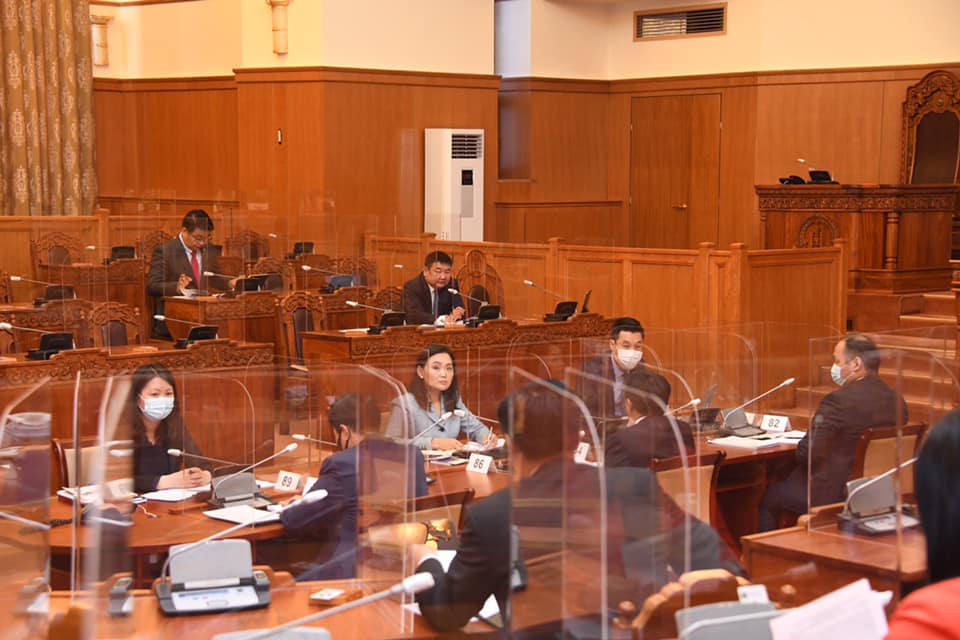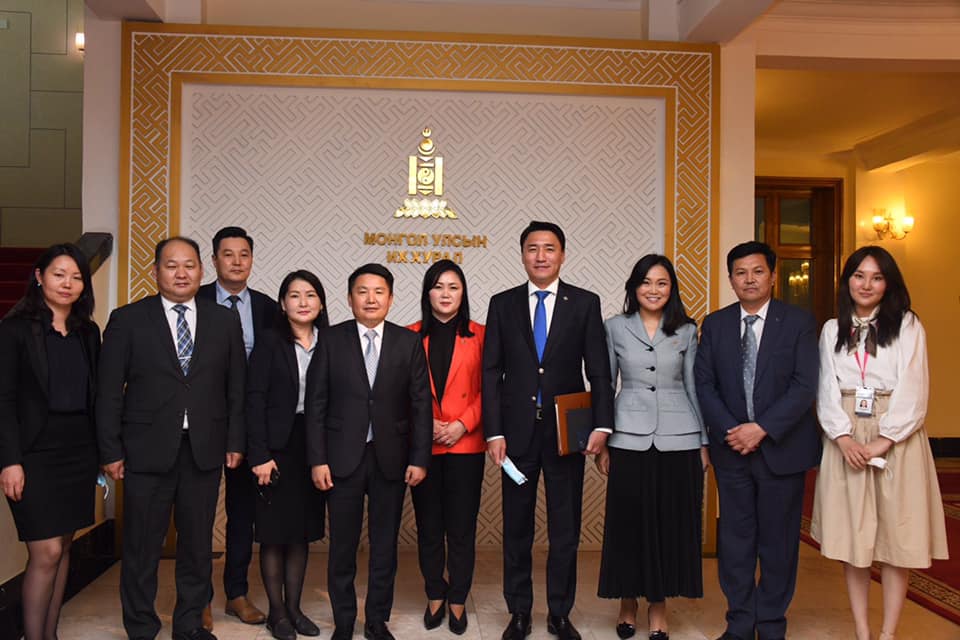THE FIRST DISCUSSION OF THE DRAFT CULTURAL LAW

After 25 years, the revised draft of the “Law on Culture” was submitted to the plenary session of the State Great Hural for the first discussion on June 18, 2021. Resolution No. 3 of the Standing Committee on Education, Culture, Science and Sports of December 16, 2020 established a working group to prepare the revised draft of the Law on Culture and other draft laws submitted for discussion at the Standing Committee meetings and plenary sessions. The team was headed by MP G.Munkhtsetseg and consisted of MPs G.Amartuvshin, P.Anujin, B.Bayarsaikhan, H.Gankhuyag, G.Damdinnyam and Ch.Undram.
G. Munkhtsetseg, Member of Parliament and Head of the Working Group, made a presentation on the revised draft law. He said, "The working group met three times and the working group to provide technical and methodological assistance to the working group met nine times. The proposals were formulated as follows:
1. Policy issues included in the objectives of the draft law have been added as new items.
2. Engage in cultural activities, which are based on public participation and activities. He also outlined the cultural activities to be supported by the state in order to differentiate Mongolians from others and to identify and protect the unique nature of Mongolian culture.
3. Expanded cultural studies and cultural education activities, and added new articles to regulate the registration and evaluation of cultural values.
4. The rights and responsibilities of citizens and cultural workers in cultural activities, business entities and public participation shall be specified, support for the activities of state and local owned cultural organizations shall be provided, and a council with public participation may be established. .
5. A new chapter, Partnerships and Cooperation in the Cultural Sector, will be added. to promote effective cooperation between governmental and non-governmental organizations, the private sector and citizens.
6. The draft includes relevant provisions to create opportunities and conditions for Mongolian citizens living abroad to participate in cultural activities and get to know Mongolian culture.
7. Coordinates the development of cultural environment and space as part of cultural tourism to promote cultural expression that has a positive impact on social relations.
8. The conditions and requirements for cultural activities have been added.
During the discussion of the draft law, MP B. Battumur said, “One of the many gateways to Mongolia's development is the cultural sector. Protecting and developing national history and culture is a national immunity. One of the most important issues for arts and culture organizations is funding. The income of these organizations goes to the state budget, but they are not self-financing. ”
Minister of Culture Ch. Nomin said, “Culture develops only when it is used. In this sense, we believe that the economy will be able to enter into circulation and develop further. Therefore, economic provisions are included. In particular, there are provisions to support creative cultural production, and there are provisions to support the state. The cultural sector has been neglected in the past, so in the last four months we have conducted a baseline study of the sector, defining its scope in 12 areas. In particular, the priorities of the cultural sector will be identified and further developed. There is a law on national holidays. The festival has a special law because it consists not only of cultural issues, but also of public holidays and sports competitions. ”
MP G. Munkhtsetseg said, “There is every reason to consider the Cultural Law as the original law. Therefore, capacity building of professionals in cultural institutions and provisions are included. There are also provisions that culture must be put into economic circulation. International standards are well studied. Emphasis was placed on equalizing the salaries and pensions of cultural organizations. In particular, it provides for a five-year stipend for professionals working in remote areas. In addition, arts and culture organizations have increased their income and increased their opportunities to create art. There is a provision for customs tax exemptions for the import of cultural equipment. It has the advantage of reflecting the issues that were left out of the idea of having a cultural inspector. ”
MP B. Bat-Erdene said, “We support this law. The relevant people in the new ministry also worked well. What do you think is the uniqueness of Mongolian heritage? Special attention should be paid to this issue. "We've been looking at appearances for the last 30 years, and we're starting to lose our heritage."
Minister of Culture Ch.Nomin said, “Mongolians are a nomadic people who have made a great contribution to human culture. Article 8.2, which defines the areas of special cultural activities to be supported by the state, states, “Nomadic civilizations are included. Furthermore, Article 8.7 contains specific provisions on the protection and prevention of the destruction of cultural heritage. ”
MP G.Damdinnyam said, “In terms of policy, there is a law that includes all the cultural heritage of Mongolia, protection from incoming cultural attacks, dissemination of our culture, and specialists. "Electronic registration is important for the registration of cultural heritage that has been smuggled across the border."

After 25 years, the revised draft of the “Law on Culture” was submitted to the plenary session of the State Great Hural for the first discussion on June 18, 2021. Resolution No. 3 of the Standing Committee on Education, Culture, Science and Sports of December 16, 2020 established a working group to prepare the revised draft of the Law on Culture and other draft laws submitted for discussion at the Standing Committee meetings and plenary sessions. The team was headed by MP G.Munkhtsetseg and consisted of MPs G.Amartuvshin, P.Anujin, B.Bayarsaikhan, H.Gankhuyag, G.Damdinnyam and Ch.Undram.
G. Munkhtsetseg, Member of Parliament and Head of the Working Group, made a presentation on the revised draft law. He said, "The working group met three times and the working group to provide technical and methodological assistance to the working group met nine times. The proposals were formulated as follows:
1. Policy issues included in the objectives of the draft law have been added as new items.
2. Engage in cultural activities, which are based on public participation and activities. He also outlined the cultural activities to be supported by the state in order to differentiate Mongolians from others and to identify and protect the unique nature of Mongolian culture.
3. Expanded cultural studies and cultural education activities, and added new articles to regulate the registration and evaluation of cultural values.
4. The rights and responsibilities of citizens and cultural workers in cultural activities, business entities and public participation shall be specified, support for the activities of state and local owned cultural organizations shall be provided, and a council with public participation may be established. .
5. A new chapter, Partnerships and Cooperation in the Cultural Sector, will be added. to promote effective cooperation between governmental and non-governmental organizations, the private sector and citizens.
6. The draft includes relevant provisions to create opportunities and conditions for Mongolian citizens living abroad to participate in cultural activities and get to know Mongolian culture.
7. Coordinates the development of cultural environment and space as part of cultural tourism to promote cultural expression that has a positive impact on social relations.
8. The conditions and requirements for cultural activities have been added.
During the discussion of the draft law, MP B. Battumur said, “One of the many gateways to Mongolia's development is the cultural sector. Protecting and developing national history and culture is a national immunity. One of the most important issues for arts and culture organizations is funding. The income of these organizations goes to the state budget, but they are not self-financing. ”
Minister of Culture Ch. Nomin said, “Culture develops only when it is used. In this sense, we believe that the economy will be able to enter into circulation and develop further. Therefore, economic provisions are included. In particular, there are provisions to support creative cultural production, and there are provisions to support the state. The cultural sector has been neglected in the past, so in the last four months we have conducted a baseline study of the sector, defining its scope in 12 areas. In particular, the priorities of the cultural sector will be identified and further developed. There is a law on national holidays. The festival has a special law because it consists not only of cultural issues, but also of public holidays and sports competitions. ”
MP G. Munkhtsetseg said, “There is every reason to consider the Cultural Law as the original law. Therefore, capacity building of professionals in cultural institutions and provisions are included. There are also provisions that culture must be put into economic circulation. International standards are well studied. Emphasis was placed on equalizing the salaries and pensions of cultural organizations. In particular, it provides for a five-year stipend for professionals working in remote areas. In addition, arts and culture organizations have increased their income and increased their opportunities to create art. There is a provision for customs tax exemptions for the import of cultural equipment. It has the advantage of reflecting the issues that were left out of the idea of having a cultural inspector. ”
MP B. Bat-Erdene said, “We support this law. The relevant people in the new ministry also worked well. What do you think is the uniqueness of Mongolian heritage? Special attention should be paid to this issue. "We've been looking at appearances for the last 30 years, and we're starting to lose our heritage."
Minister of Culture Ch.Nomin said, “Mongolians are a nomadic people who have made a great contribution to human culture. Article 8.2, which defines the areas of special cultural activities to be supported by the state, states, “Nomadic civilizations are included. Furthermore, Article 8.7 contains specific provisions on the protection and prevention of the destruction of cultural heritage. ”
MP G.Damdinnyam said, “In terms of policy, there is a law that includes all the cultural heritage of Mongolia, protection from incoming cultural attacks, dissemination of our culture, and specialists. "Electronic registration is important for the registration of cultural heritage that has been smuggled across the border."
